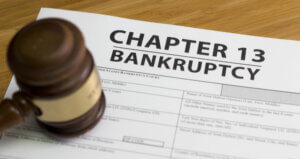Bankruptcy can be a saving grace if you’re in over your head, but it isn’t a cure-all. Discover the types of debt bankruptcy won’t discharge.
Have you reached the point where Chapter 7 Bankruptcy seems like the only way to get things back on track?
Well, you aren’t alone. Just under half a million people filed for Chapter 7 Bankruptcy in the U.S. between June 2017 and June 2018.
But there are types of debt bankruptcy doesn’t erase. So even after filing, you could still be on the hook.
We compiled the following list of debts not discharged automatically by Chapter 7 Bankruptcy.
Three Types of Debt
There are many different types of debt, and not all are easily erased. When filing for bankruptcy, your debts fall into three categories: non-dischargeable, difficult to discharge and dischargeable.
Bankruptcy usually eliminates all debt in the first category. Dischargeable debt includes things like mortgages, credit cards and medical bills.
We’ll focus more on the types of debt that aren’t or are significantly harder to erase.
Non-Dischargeable Debt
Here are the types of debt that bankruptcy does nothing about. You’ll remain liable to repay these. Failure to do so can result in direct action from creditors or the government.
- Child support or alimony
Child support and alimony payments are non-dischargeable. So you may face several of the following actions if they are unpaid:
- Your federal tax refunds may be seized
- Your wages could be garnished
- Your property may be seized
- Any occupational or business licenses you hold may be suspended
- The government may revoke your driver’s license
It is important to do whatever you can to make these payments despite declaring bankruptcy. Because failure to pay these debts directly impacts other private individuals and minors, the courts take them seriously. Child support enforcement FAQ.
- Government fines
Any government fines incurred from breaking the law remain your responsibility. Bankruptcy will not absolve you of these obligations.
- Drunken driving-related costs
If you have been convicted of drunken driving resulting in the injury or death of someone, you remain responsible for those costs. This includes any fines or bail as mentioned above, as well as court and legal costs for yourself and/or the injured party.
- Condo fees
If you file Chapter 7 Bankruptcy, you still have to pay any condo fees you owe. This is also true for co-op fees and home owners association fees.
The exception here would be to give up your condo or home. In that case, it may be possible to have the fees discharged. However, this only includes fees from before your date of filing. Any fees accrued after your filing date remain your responsibility.
- Certain taxes
Bankruptcy cannot discharge most types of taxes. This includes, but is not limited to, sales, payroll and property taxes.
Hard to Discharge Debt
There are several types of debt not easily discharged. These require you to do extra work to persuade the court an exception should be applied to you.
- Student loans
Bankruptcies do not eliminate student loan debt unless it is determined by the court the debt will cause undue hardship to you or your dependents.
The most common way they determine this is by the Brunner Test. The Brunner Test assesses the following criteria:
- Whether you can maintain a minimal standard of living while you pay off your loan
- If circumstances show your situation will persist for a large part of the life of your loan
- You made efforts to repay the loan
- Income tax
Income tax is difficult to get discharged but may qualify under the right circumstances. Here are some of the metrics used to determine whether your income tax can be discharged:
- You did not commit tax fraud or knowingly commit tax evasion
- The debt is three years or older
- You filed a tax return
- You pass the 240-day rule. (The tax assessment occurred at least 240 days before filing bankruptcy)
- Debts Creditors Object to Discharging
There are some types of debts that are discharged unless the creditor specifically objects. If they do, they must convince the court. This is more likely to occur if the debt is the result of:
- Fraud, including luxuries over $675
- Your willful and malicious actions
- Embezzlement, larceny or other financial misconduct
Also, if debt is owed to creditors not listed on your bankruptcy paperwork. That’s particularly worrisome because it’s largely avoidable. If your paperwork is filled out correctly, this should not be an issue. If this is something you need help with, contact us and we’ll be happy to help.
No Perfect Solution
Bankruptcy is not a complete debt solution. While useful to remove some types of debt, other debt may stick with you. You can maximize the amount of debt you discharge by hiring a good legal team.
A knowledgeable team of experts can maximize the impact of your bankruptcy on your debts.
We want to help you take care of your debt. We’ll work with you to get back on the right track. Click or call (402) 415-2525
to schedule a consultation.






